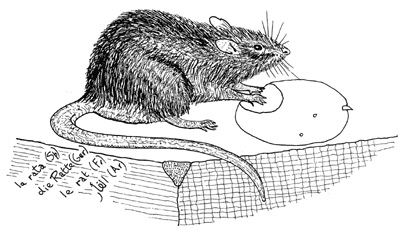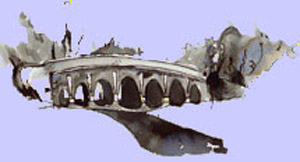|
|
|
| Colney Nature Watch |
| A series of articles on the wild life in London Colney |
| Rats |

Recently I saw some beautiful rats.
They were clean and their fur shiny. Their eyes were bright and alert.
They looked happy and intelligent. They were living in rats’ heaven!
The garden owner was a keen ornithologist. He put out grains and nuts
for the birds to eat. The excess food fell to the ground, and the rats
were only too keen to eat it. For most rats - life is hard. But these
rats had a steady food supply in a wooded area which was only visited
by people who valued wild life. These rats lived in a colony of females,
ruled over by a dominant male, who would see off any other rats who came
into the area. You can often hear rats squeaking to each other, but they
usually communicate by ultra-sound - which we cannot hear.
If you see a rat, it is most likely to be a brown rat (rattus norvegicus),
rather than the extremely rare black rat. Brown rats can be a wide variety
of colours, and were first seen in Britain in 1728. Because they thrive
near places people work and live, they largely displaced the native black
rat, in the same way that the introduced grey squirrel has replaced the
native red squirrel.
People who keep rats as pets find them friendly, affectionate and intelligent.
In Angola and Mozambique, rats are used to sniff out land mines. They
can smell the TNT in them, and because they are light, do not set the
mine off. Their owner can defuse the mine and destroy it, after rewarding
the rat. Large areas of land in both countries have been rendered cultivable
thanks to these useful rats. Yet here, most people dislike rats - and
with reason.
Rats will eat any food that people like. The problem is,rats render the
food they don’t take inedible. They defecate everywhere, and they
leave their urine all over the place. Outside they leave urine trail,
so other rats can follow them. - This is a mixed blessing, as many carnivorous
birds see dried rats’ urine, and know where to lurk if they want
to catch them. Rats’ urine carries a variety of diseases, and because
there are many rats living near our river, we recommend that people do
not bathe in the river.
Where food and shelter are good, a pair of rats could produce five litters
a year. Each rat is sexually mature after three months, and a litter can
contain a dozen. You’ll wonder why Britain isn’t meters deep
in rats!
In the wild, rats face many enemies. Owls, hawks, kites and snakes eat
rats. So do foxes and badgers. Most rats die young because there is insufficient
food around, others from illnesses, in accidents, or in fights to establish
themselves in already occupied territory. A healthy dog who has already
killed a few rats will have no difficulty killing more. However, cats
are not a lot larger than rats, and in a confrontation could end up receiving
nasty bites that could take time to heal.
A few years back, I had rats in my composter. I phoned the council, who
sent a personable young man round to discuss the problem. He put a tray
of cereal in the composter, which the rats ate. When he came next time,
he put more cereal in the composter - but this time laced with anticoagulant
drug, the rat would eat it and subsequently die from internal bleeding.
Next time the rat catcher came, he was able to show me the carcase of
a rat he found in my composter.
If you ask the cou ncil to send a rat catcher today, they will not be
so willing. They will ask for evidence that you have a rat problem. and
then tell you to stop putting kitchen waste in the composter, only garden
rubbish. After a while, the rat will realise he’s not on a meal ticket
for life, and go elsewhere. The anticoagulant drugs which were once so
effective at killing rats do not work so well today, as all the rats which
were once susceptible to the poison have died without issue, and the rats
which were more resistant have mated with other resistant rats to create
a new population that is immune to the traditional poisons. If a rat dies
from poison, and a dog or cat finds it, they will happily eat it, making
themselves ill - or worse.
So if you find rats living in your compost heap you’ve two choices,
either you poison the rat, and risk hurting other animals. or you put
kitchen waste elsewhere, and make sure there is no food lying around which
rats particularly like. It’s up to you! |
|
|




